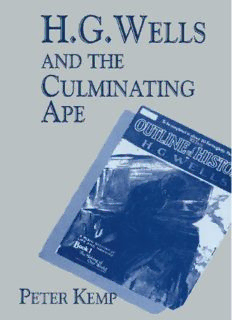
H. G. Wells and the Culminating Ape: Biological Imperatives and Imaginative Obsessions PDF
Preview H. G. Wells and the Culminating Ape: Biological Imperatives and Imaginative Obsessions
H. G. WELLS AND THE CULMINATING APE By the same author MURIEL SPARK H. G. Wells and the Cullllinating Ape Biological Imperatives and Imaginative Obsessions Peter Kemp Published in Great Britain by MACMILLAN PRESS LTD Houndmills. Basingstoke. Hampshire RG21 6XS and London Companies and representatives throughout the world A catalogue record for this book is available from the British Library. ISBN 978-0-333-67893-0 ISBN 978-1-349-24832-2 (eBook) DOI 10.1007/978-1-349-24832-2 Published in the United States of America by ST. MARTIN'S PRESS, INC., Scholarly and Reference Division. 175 Fifth A venue. New York, N.Y. 10010 ISBN 978-0-312-35592-0 (hardcover) ISBN 978-0-312-16489-8 (paperback) Library of Congress Cataloging-in-Publication Data applied for. © Peter Kemp 1982, 1996 First edition 1982 Reprinted (with alterations) 1996 All rights reserved. No reproduction, copy or transmission of this publication may be made without written permission. No paragraph of this publication may be reproduced, copied or transmitted save with written permission or in accordance with the provisions of the Copyright, Designs and Patents Act 1988, or under the terms of any licence permitting limited copying issued by the Copyright Licensing Agency, 90 Tottenham Court Road, London WI P 9HE. Any person who does any unauthorised act in relation to this publication may be liable to criminal prosecution and civil claims for damages. 10 9 8 7 6 5 4 3 2 I 05 04 03 02 01 00 99 98 97 96 To David Grylls Contents Acknowledgements viii Preface to the 1996 Rep·rint IX Introduction: Wells and Biology 1 1 The Edible Predator: Wells and Food 7 2 The Slave Goddess: Wells and Sex 73 3 The Redeveloped Basement: Wells and Habitat 119 4 The Pugnacious Pacifist: Wells and Survival-Mechanisms 145 5 The Grand Earthly: Wells and Self-Image 187 Postscript ( 1996 ): Stains and Whitewash 215 Bibliography 221 Index 227 Acknowledgements I should like to thank Professor G. P. Wells for permission to quote from The Outline of History, A Short History of the World, The Science of Life and The Work, Wealth and Happiness of Mankind; and the Trustees of the Estate of H. G. Wells and Professor G. P. Wells for permission to quote from all other books by Wells. In addition, I wish to acknowledge my gratitude to all who have helped in the production of this book-particularly David Grylls, Gail Cunningham, David Brown and judith Stinton. Preface to the 1996 Reprint This book was written in the belief that H. G. Wells's prodigious achievement can only be fully appreciated through a full exploration of his work. Earlier critical studies, conscious of the unevenness of his output and the prolixity of much of his later writing, often concentrated almost entirely upon Wells's most accomplished phase: the period from 1895 to 1910 during which he produced his best science fiction and his Edwardian social novels. While exhibiting his fictional powers at their peak, this approach allowed for only a partial picture of an imagination that, as H. G. Wells and the Culminating Ape seeks to display, was exceptionally miscellaneous: rife with wayward idiosyncrasies but everywhere coloured by the biologist's view of life that Wells acquired as a science student in the South Kensington lecture theatre of Charles Darwin's champion, T. H. Huxley. Since this book first appeared in 1982, another kind of partialness - in fact, of partiality - has been promoting a lopsided image of Wells. In recent years, some critics and biographers, eager to portray Wells as unimpeachably progressive, have ignored or bowdlerised opinions he expressed, courses of action he advocated, and scenarios he enthusiastically envisaged concerning eugenics, population control, racial attributes and relations between the sexes. This phenomenon is examined in a postscript to this new edition, which is published to coincide with the fiftieth anniversary of the death, in August 1946, of the man who - born as a mid Victorian - became one of the most remarkable and influential figures of the twentieth century. Peter Kemp, 1996 Introduction: Wells and Biology A scientific education saved Wells's life: he assumed it would do the same for the world. Poverty undermined his health from childhood onwards. Drudgery in draperies sapped his energy as a young man. Had he not got away from these conditions, he once said, he could not have survived late into life. What rescued him was the grant he won to study science at South Kensington. Before this, deprivation and frustration dragged at his vitality; after it, he bounded energetically towards affluence and achievement. Not surprisingly, he came to believe that science was-as he affirmed in his college's old students' bulletin 'the light and redemption of the world'. For over fifty years, he cast himself as the evangelist, and sometimes the messiah, of this gospel. In his Experiment in Autobiography, Wells recalls the day he enrolled at the Normal School of Science as 'one of the great days of my life'. It led to what was 'beyond all question, the most educational year of my life'-a year spent studying biology with T. H. Huxley. This veteran campaigner for evolutionary theory and scientific education influenced his student in two ways. His career showed Wells what could be achieved, despite a dis advantaged background, by conviction and pugnacity. His course in biology-'a vivid, sustained attempt to see life clearly and to see it whole, to see into it, to see its inter-connexions, to find out ... what it was, where it came from, what it was doing and where it was going'-mapped out what Wells would try to establish and convey throughout a prolific writing-life. 'To lay down the main lines of Mr Wells's Weltanschauung', F. H. Doughty wrote in 1926, 'necessitates a bird's-eye view of a range of material appalling in its extent.' By the time Wells died, twenty years after this, he had heaped a miscellany of nearly
Description: